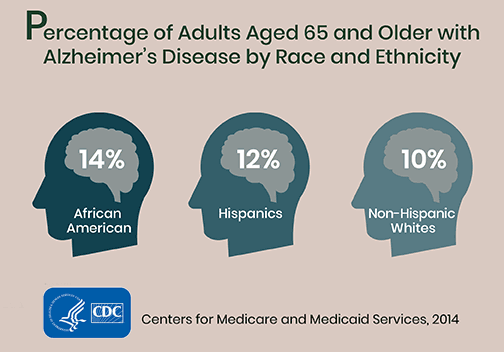Alzheimer's disease is the fifth leading cause of death for people 65 and older.
Death rates for Alzheimer's disease are increasing, unlike heart disease and cancer death rates, which are on the decline. The number of Alzheimer's disease cases is expected to more than double to 14 million by 2050.
Warning Signs
Alzheimer's disease is not a normal part of aging. Memory problems are typically one of the first warning signs of Alzheimer's disease and related dementias.
In addition to memory problems, someone with symptoms of Alzheimer's disease may experience one or more of the following:
- Memory loss that disrupts daily life, such as getting lost in a familiar place or repeating questions.
- Trouble handling money and paying bills.
- Difficulty completing familiar tasks at home, at work or at leisure.
- Decreased or poor judgment.
- Misplacing things and being unable to retrace steps to find them.
- Changes in mood, personality, or behavior.
More Information
Even if you or someone you know has several or even most of these signs, it doesn't mean it's Alzheimer's disease.
People with one or more of these 10 warning signs should see a doctor to find the cause. Early diagnosis gives them a chance to seek treatment and plan for the future.
Who Is Affected

- In 2020, as many as 5.8 million Americans were living with Alzheimer's disease.
- Younger people may get Alzheimer's disease, but it is less common.
- The number of people living with the disease doubles every 5 years beyond age 65.
- This number is projected to nearly triple to 14 million people by 2050.
- Symptoms of the disease can first appear after age 60, and the risk increases with age.
Risk Factors for Alzheimer's Disease
Several factors may contribute to your risk of developing Alzheimer's disease.
- Increasing age
- A family history of Alzheimer's
- An unhealthy lifestyle
Reducing Your Risk
There is growing scientific evidence that healthy behaviors which prevent other chronic diseases may also may reduce your risk for dementia and Alzheimer's. Here are steps you can take for a healthy body and healthier brain.
- Quit smoking: Quitting smoking now improves your health and reduces your risk of heart disease, cancer, lung disease, and other smoking-related illnesses. How to quit
- Prevent and manage high blood pressure:: Tens of thousands of Mississippians have high blood pressure, and many do not have it under control. Get started
- Prevent and manage high cholesterol: High cholesterol contributes to Mississippi's high rates of heart disease. Lower your risk
- Maintain a healthy weight: Healthy weight isn't about short-term dietary changes. Instead, it's about a lifestyle that includes healthy eating and regular physical activity. Find out more
- Get enough sleep: Sleep is important for your body to maintain brain health Improve your sleep
- Stay engaged: Stay active socially, with family, and get involved in community events.
- Manage blood sugar: High blood sugar affects all the organs of the body, including the brain. Keep it in control
- If you drink, do so in moderation: Excess alcohol degrades brain health over time. Learn about health and alcohol use

